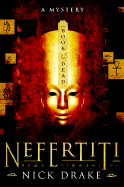
 More than three thousand years ago, Egyptian King Akhenaten inherited an empire at the peak of its power and wealth, at "a time of astonishing sophistication and beauty, but also of vanity and brutality." He and his Great Royal Wife, Nefertiti, began a period of extreme change, particularly in religion. They rejected the old gods, challenged the powerful priesthood and instituted the worship of the One God, the Sun, the Aten. They built a magnificent city, Akhetaten, to underscore these changes and to create a place untainted by other gods. It was a magnificent artifice, where status and power were laid out with an astonishing precision, where dogs did not bark and buildings were painted and polished to perfection. Against this backdrop, Rai Rahotep, the youngest chief detective of the Thebes Medjay division, is called by the king to journey to Akhetaten to investigate a mystery.
More than three thousand years ago, Egyptian King Akhenaten inherited an empire at the peak of its power and wealth, at "a time of astonishing sophistication and beauty, but also of vanity and brutality." He and his Great Royal Wife, Nefertiti, began a period of extreme change, particularly in religion. They rejected the old gods, challenged the powerful priesthood and instituted the worship of the One God, the Sun, the Aten. They built a magnificent city, Akhetaten, to underscore these changes and to create a place untainted by other gods. It was a magnificent artifice, where status and power were laid out with an astonishing precision, where dogs did not bark and buildings were painted and polished to perfection. Against this backdrop, Rai Rahotep, the youngest chief detective of the Thebes Medjay division, is called by the king to journey to Akhetaten to investigate a mystery.He knows he's living in extraordinary times, but for him they are filled with danger and misery, and his thoughts are tormented by his work. "Things grow worse. I see it in my work: in the ever-increasing numbers of tormented and mutilated bodies of murder victims; and in the robed and desecrated tombs of the rich and powerful, with the Nubian security guards grinning from ear to ear through their slit throats. I see it in the ostentation of the rich and the endless misery of the poor . . . I see it in the imposition of the strange new god . . . in the eccentric conception and extravagant expense of the mysterious new temple city Ahketaten." As he travels down the river to his meeting with Akhenaten, he narrowly misses being killed by an arrow shot in the night, an arrow with an unusual silver tip, whose shaft is marked with the hieroglyphs for Cobra and for Seth, the god of chaos and confusion. Rahotep doesn't know if he survived by chance, or if the shot was a warning. He thinks, "I must be sober as the great serpent of water carries me away from all I know, and all I love, on its blackness, its perpetual glittering scales, with its sightless memory of a long journey from high in the unknown stones of Nubia, down through the great cataracts, and into the fields, into the fruits and vegetables, into the wine, into the sea; and somewhere into snow."
He soon learns the nature of the mystery from the king: Nefertiti, the Perfect One, has disappeared 10 days before a great celebration to inaugurate the new regime. Without the popular and charismatic queen, his divine imprimatur for the new order will be seen as compromised. If Rahotep does not find her, not only will he die, but his family with him, and not quickly. When the detective questions the king about why he was chosen, Akhenaten says, "I have heard interesting things about you. You have new ideas. You can trace the clues of a mystery to their hidden source. You persuade criminals to confess without torture. You enjoy the dark and dead ends of the crooked labyrinth of the human heart." A short time later, Rahotep and his court-appointed assistant Khety discover a body that seems to be Nefertiti's, but perhaps it is a ruse. Much is at stake--not only the lives of his family, but the life of his country, and he realizes he has only begun his quest for the truth.
The Medjay detective is a delightful character--intelligent, thoughtful, passionate, a wine connoisseur ("a Hatti white is a rare opportunity") with a dry wit: "[Mahu's] fastidious appraisal of my own rather travel-worn clothing seemed to indicate any irony on my part would be cancelled out by the evident inadequacy, and therefore lack of self-belief, of my own appearance." The mystery is satisfying, as is the palace intrigue, especially since the basis of the story is true: Nefertiti did disappear from all official documentation at this time without an explanation. Equally pleasing is Drake's atmospheric writing, from splendid architectural descriptions to Nile bird-hunting scenes. The reader is easily transported to ancient Egypt of the sun-white glare, the dusty heat, the moon-lit desert, the starry sky presided over by the goddess Nut, and always the Great River: "They say the gods possess the river, and that the river is a god, but I think its owners are the Priests in the offices, and the rich with their villas and terraces where the cool water laps at their soft and lazy feet." One hopes this is the start of a long run for Nick Drake and Rai Rahotep.--Marilyn Dahl

